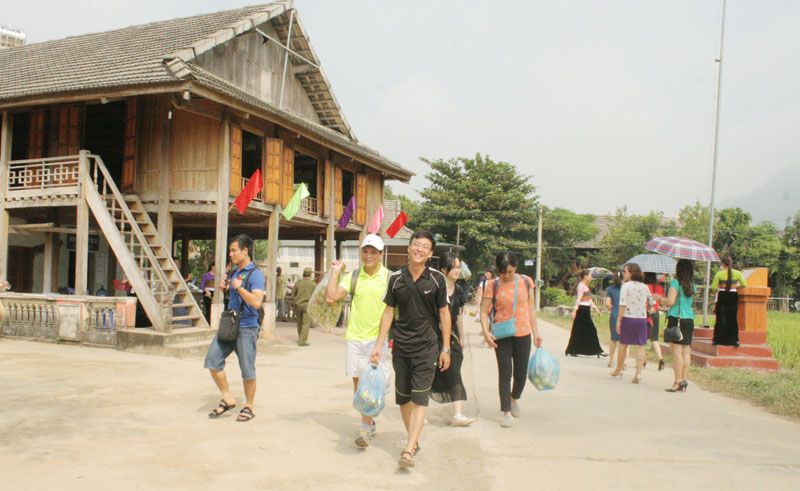
(HBO) – The festival of outstanding community-based tourism villages 2017 is scheduled to take place from September 29-October 1 at Mai Chau district’s stadium and other locations in Mai Chau town. Nguyen Van Chuong, Vice Chairman of the municipal People’s Committee and head of the festival organising board, granted an interview to the Hoa Binh Newspaper about the event.

Lac village - a community-based tourist destination in Chieng
Chau commune (Mai Chau district) attracts a large number of visitors (Photo:
HBO).
Reporter: Could you unveil the purpose and significance of
organising the festival of outstanding community-based tourism villages 2017?
Mr Nguyen Van Chuong: The festival is one
of the activities hosted by Hoa Binh province in response to the Lao Cai –
Northwest National Tourism Year 2017. It aims to promote the province’s tourism
potentials, thus preserving cultural traditions of ethnic groups in the
northwest region and nationwide. The event will extend cultural exchanges among
ethnic groups and introduce effective community-based tourism models in
Vietnam.
Reporter: Could you
introduce the major contents of the festival?
Mr Nguyen Van Chuong: The event runs from September 29 to October 1 with the participation of
14 outstanding community-based tourism villages, including Thai group village
in Mai Chau, Muong group village in Tan Lac, and others in Lao Cai, Yen Bai,
Phu Tho, Son La, Dien Bien, Lai Chau, Ha Giang, Bac Kan, Thanh Hoa, Hanoi and
other provinces.
Major activities of the festival consist of an exhibition of tourism
products, craft-making shows, a photo exhibition on tourism in Hoa Binh and extended
Northwest region, and a festival spotlighting traditional music and costumes of
ethnic groups. The festival is set to begin at 7:30 pm on September 30.
A scientific seminar on sustainable development of community-based
tourism in the northwest region will be co-chaired by the provincial People’s
Committee and the Vietnam National Administration of Tourism. A cooking contest
will also take place during the festival.
Reporter: Thank you!
With an increasingly vibrant and widespread emulation movement aimed at building cultured residential areas and cultured families, Yen Thuy District has been making steady progress toward improving both the material and spiritual well-being of its people, while fostering a civilized, prosperous, beautiful, and progressive community.
Once lacking recreational spaces and community facilities, Residential Group 2 in Quynh Lam Ward (Hoa Binh City) has recently received attention for the construction of a new, spacious, and fully equipped cultural house. The project followed the model of state support combined with public contributions in both labor and funding.
The "All people unite to build cultural life" movement, which has been effectively integrated with Kim Boi district’s socio-economic development goals, is fostering a lively spirit of emulation across local residential areas, hamlets, villages, public agencies, and enterprises. In addition, through the initiative, traditional cultural values are being preserved and promoted, while community solidarity and mutual support in poverty reduction and economic development are being strengthened.
A working delegation of the Hoa Binh provincial People’s Committee led by its Permanent Vice Chairman Nguyen Van Toan on June 11 inspected the progress of a project to build the Mo Muong Cultural Heritage Conservation Space linked to tourism services in Hop Phong commune, Cao Phong district.
Born and growing in the heroic land of Muong Dong, Dinh Thi Kieu Dung, a resident in Bo town of Kim Boi district, in her childhood was nurtured by the sweet lullabies of her grandmother and mother. These melodies deeply imprinted on her soul, becoming an inseparable part of her love for her ethnic group's culture. For over 20 years, this love for her hometown has driven Dung to research, collect, and pass down the cultural values of the Muong people to future generations.
In the final days of May, the Ethnic Art Troupe of Hoa Binh Province organized performances to serve the people in remote, mountainous, and particularly disadvantaged areas within the province. These were not just ordinary artistic shows, but they were the meaningful journeys aimed at spreading cultural values, enhancing the spiritual life of the people and contributing to the preservation of ethnic minority cultural identities.



